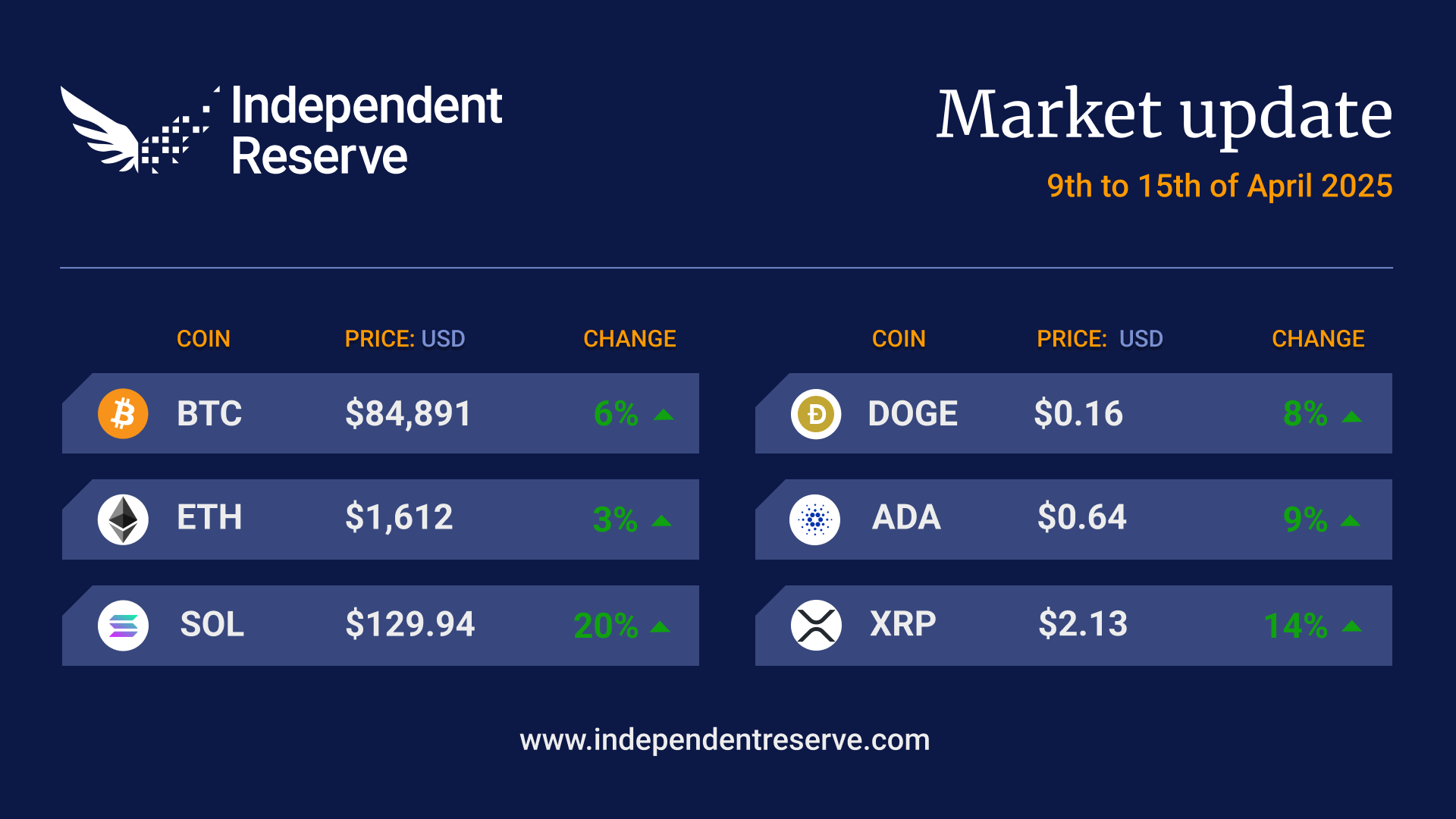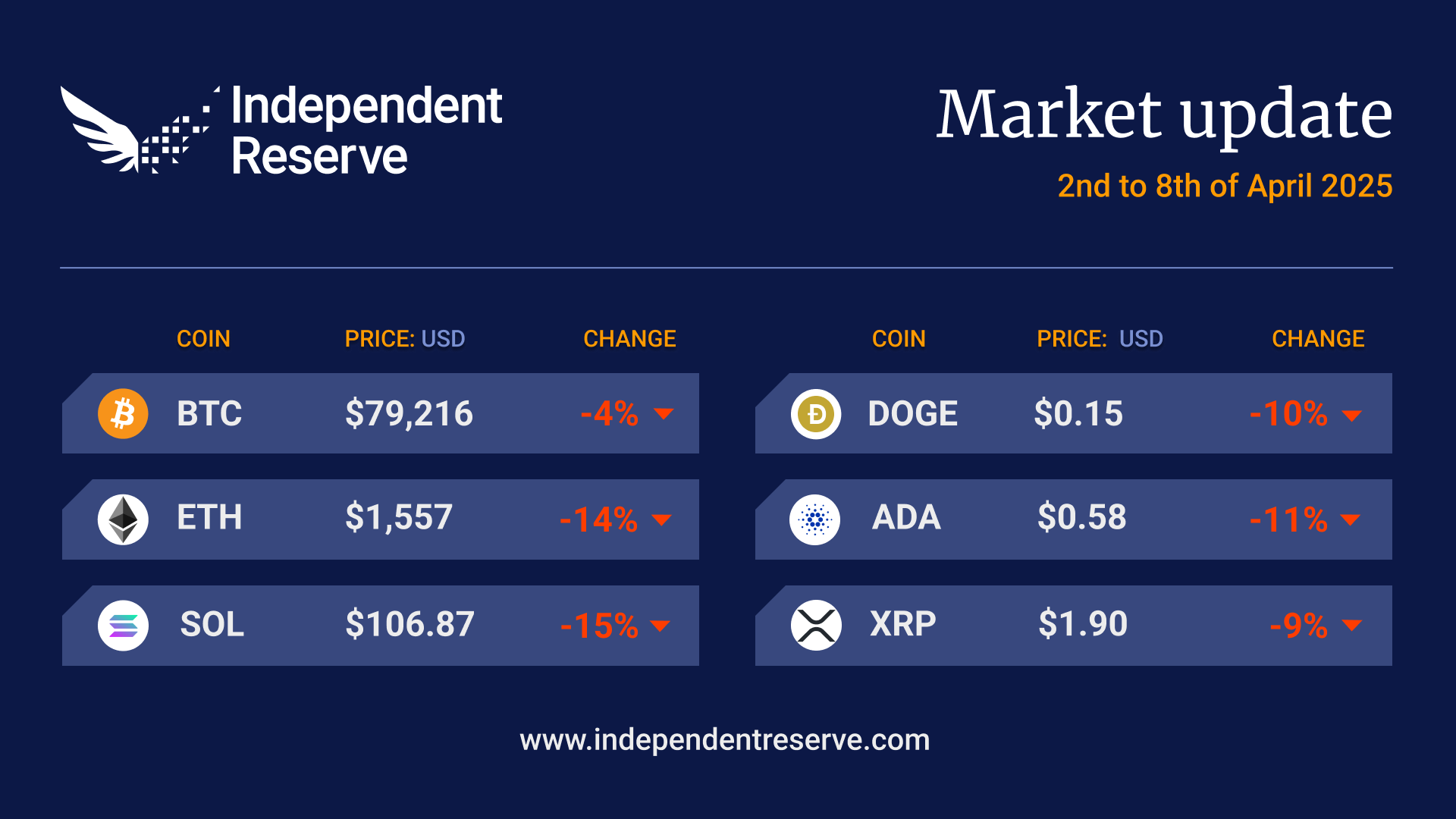In Markets
Crypto and tech stocks plunged due to the release of a new Chinese AI model called DeepSeek, which is competitive with the best models from OpenAI but claims to have training costs 95% cheaper, suggesting that US AI stocks may be overvalued. The S&P 500 and the Nasdaq fell sharply, with A$953B (US$600B) lost overnight from Nvidia’s market cap. Bitcoin miners involved in AI, such as Core Scientific, Terawulf and Iren lost a quarter of their value. Bitcoin had risen above A$170K (US$105K) earlier in the week as hopes grew for a Bitcoin reserve announcement, but has since stabilised at around A$163,078 (US$102,797) today, which is 1% down on the same time last week. Analysts from Standard Chartered and LondonCryptoClub see it as a buy-the-dip opportunity. Ethereum finishes the week down 2% to trade around A$5,087 (US$3,189). XRP lost 1%, Solana lost 3%, while Dogecoin (-5%), Cardano (-6%) and Shiba Inu (-8%) were also down. The Crypto Fear and Greed Index is at 71, or Greed.

In Headlines
Trump admin is unreserved
Donald Trump’s executive order on crypto didn’t happen on Day One as hoped, but it did happen, with the President banning CBDCs in favour of “lawful and legitimate dollar-backed stablecoins worldwide.” He also ordered the creation of a Digital Asset Working Group to propose regulations and examine the creation of a national “digital asset stockpile.” The potential stockpile falls a long way short of a Bitcoin reserve, and is likely to simply avoid selling any of its seized cryptocurrencies (the US has 17 different tokens). The fact the stockpile isn’t Bitcoin-only upset many Bitcoiners who took out their anger on Ripple, which is believed to have been lobbying for XRP’s inclusion. Former SEC commissioner Amy Lynch told USA Today that the order gave crypto legitimacy. “Once regulation is in place and the new executive orders are carried out (if not changed substantially by the Working Group), then cryptocurrency transactions in the USA will multiply exponentially,” she said. Trump also pardoned Silk Road founder Ross Ulbricht.
New look SEC and CFTC
With former chair Gary Gensler out, pro-crypto commissioner Mark Uyeda has stepped into the role of acting chair until Trump’s proposed candidate, Paul Atkins, can take over. He immediately put Hester ‘Crypto Mom’ Peirce in charge of a crypto task force to overhaul its guidelines and refine its approach. Peirce worked alongside the pro-crypto Atkins when he was a commissioner. The US Commodity Futures Trading Commission is expected to play a greater role in crypto regulations, too, and has announced a series of public roundtables on crypto market issues over the coming months to “establish clear rules of the road,” acting chair Caroline Pham said.
SAB 121 is overturned
The SEC has overturned the controversial SAB 121 guidance that prevented banks from custodying crypto. Issued in 2022, the rule told banks that crypto had to be considered a liability on their balance sheets. “Bye, bye SAB 121! It’s not been fun,” said Commissioner Hester Peirce. Lawyer Brian Daly from Akin Gump said custody services were “a predicate to everything” for banks offering crypto services to customers.
Government to run on blockchain?
Bloomberg reports that Elon Musk’s Department of Government Efficiency has initiated conversations about using blockchain “to track federal spending, secure data, make payments and even manage buildings.” DOGE representatives have reportedly met with leaders of various undisclosed blockchain projects to evaluate their technologies.
Ethereum to speed up scaling
Ethereum has been wracked with infighting over recent weeks, but this appears to have lit a fire under its leaders, with creator Vitalik Buterin releasing a scaling blog calling for efforts to be redirected toward massively increasing data availability blobs (which help L2s scale up). Paradigm also called for scaling fast at any cost. On the weekend, the leaders of Optimism, Arbitrum and Base also supported transitioning to based and/or native rollups, which would improve interoperability and make the L1 validators more central.
Larry Fink pushes SEC on tokenisation rules
BlackRock CEO Larry Fink used his keynote speech at the World Economic Forum in Davos to urge the new SEC to expedite the approval of tokenising bonds and stocks. He described tokenisation as “a game-changer for transparency, liquidity, and accessibility in financial systems” and said the benefits included the ability to democratise investments, fractional ownership and 24/7 trading with lower transaction costs and settlement times. “We’re on the cusp of a financial revolution,” Fink said. “The SEC’s leadership will be critical in making tokenization mainstream.” This week a new institutional marketing and product firm called Etherealize launched. Backed by Vitalik Buterin and the Ethereum Foundation, it plans on heavily marketing Ethereum as the natural home of tokenisation to Wall Street.
Deluge of ETF filings
Now the SEC is run by pro-crypto leaders, there’s been a surge in ETF filings. Nasdaq filed to allow in kind creation and redemption for BlackRock’s IBIT (the buying and selling of Bitcoin itself, rather than converting to cash). CoinShares filed for a spot Litecoin ETF and filed an S-1 for an XRP ETF. Grayscale refiled to convert the Solana Trust into an ETF and to convert the Litecoin Trust into an ETF. It also filed a Bitcoin Adopters ETF and an Ethereum Premium Income ETF (which uses a covered call strategy to generate income from premiums). This morning Tuttle Capital filed for 10 different leveraged crypto ETFs, including one for the Melania memecoin. Consensys founder Joe Lubin says he’s been talking to Ether ETF issuers who are confident staking will be enabled soon.


